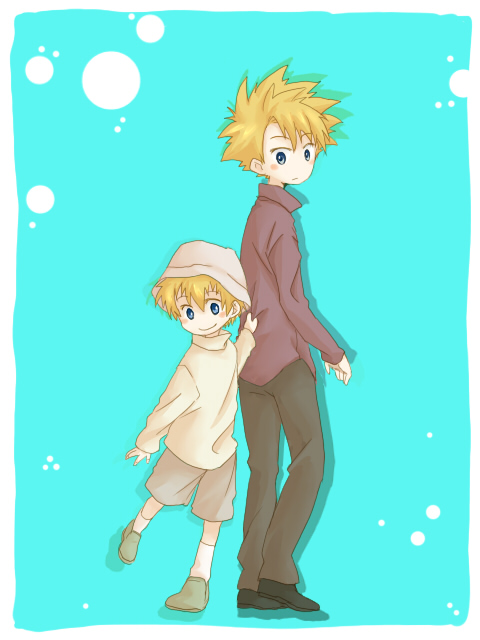In multitudes of anime series, the children largely have free reign, and often in very dangerous situations. One or both parents are nowhere to be seen – they’re either just not part of the script or one is deceased. TV Tropes calls it “parental abandonment.”
What’s rarer than deceased anime parents is finding those that are divorced or separated. In my list of anime I’ve watched, I could think of very few examples (some series I haven’t seen that include this storyline are Sailor Moon, Captain Tsubasa, Soul Eater and Mirai Nikki). And oftentimes, the split is either played for laughs (Marmalade Boy) or to create a dramatic, tragic story. Very few times is it played out, well, normally, as with Takeru and Yamato’s parents in Digimon and Kouki’s parents in Usagi Drop.

The divorce rate in Japan is much lower than than in the U.S., but it’s still significant at 27% – and it’s rising. There must be a variety of reasons for this lack of representation in anime, not least of all lack of entertainment value. But I also think the following also has to do with it:
There is still a stigma attached to divorce that can lead to a lifetime of hardship. Some elite private schools reject children from single-parent homes. Many employers try to avoid hiring divorced women if they can help it. But this has changed quite a bit in recent years as divorce has become more common.
– Facts and Details (Divorce in Japan)
Although this stigma is less strong in the U.S., and even less so in other western countries, it’s still there. And a lot of times, the feeling of guilt impressed upon divorced couples comes from Christians. Those who are supposed to be most loving are the ones who shame divorced men and women.
In the Bible, Jesus clearly presents ideas about divorce and marriage. But although He emphasizes that men and women were not meant to divorce, we often tend to forget the other side of the equation – that even if we do, Jesus is there with arms open wide, ready to receive that person in grace.
And though I think most of us wouldn’t purposely shun a man or woman who’s divorced, our lack of action (or careless words) can sometimes speak volumes. People who may already come into church feeling awkward because of their married status will only feel worse if they’re ignored or otherwise approached differently. Just like everyone else, they need love.
R86 once asked me why I liked Digimon – I refer to it often and it was really the first anime series I’d watched since being a small child. Although I didn’t think of this at the time, one part of Digimon I really liked what that the series, while a kids show, sometimes hit on some surprisingly deep and beautiful truths. Brothers Takeru and Yamato don’t easily gel – living apart, they have to learn to coexist with and care for each other. As is the theme of the show, friendship and love is key to overcoming difficulties.

And when it comes down to it, isn’t that almost always the right response? Love is the answer.
Jesus replied: “‘Love the Lord your God with all your heart and with all your soul and with all your mind.’This is the first and greatest commandment. And the second is like it: ‘Love your neighbor as yourself.’ All the Law and the Prophets hang on these two commandments.”
– Matthew 22:37-40

Further reading:
To read a bit on anime, divorce, and the effects on children, check out these posts:
- Usagi Drop episode 3 and my ramblings on divorce [Kansatsu]
- 50% of Anime Marriages End in Divorce [Beneath the Tangles]

I just went through my own list to see if I could add more, there’s Wolf’s Rain but they don’t have any child, but to be honest, most of the time I didn’t even remember who the parents were and if they were present at all.
That being said, at 7, I clearly remember not understanding and being shocked when my godfather told me he couldn’t receive the communion because he was a divorced man.
Didn’t think it was very fair. Still don’t.
Wow, that’s interesting…. To be honest, I’ve been friends with a lot of Catholics, but I know relatively little about Catholicism. That said, I won’t be hasty to criticize the practice, but I don’t particularly think it’s fair that a person is barred from receiving communion because of his or her marital status – that seems to run contrary to the idea of the catholic (lowercase “c,” not uppercase) church and the union of all believers. Though I suppose that gets into what Catholicism’s definition of a “Christian” is.
Well Catholicism has a lot of rituals, sometimes they make sense to me, sometimes they don’t. You’re not supposed to receive the communion if you haven’t gone to confession at least once in the year either.
But to be honest I’m not even sure if these practices are actually codified or if they’re just how we do/did things here.
Codified, I’m not sure…but documented, it appears so. The material I read seems to indicate, for instance, that a divorced person can receive communion under appropriate circumstances. However, a remarried person may not, unless he or she had the previous marriage nullified by the church and was remarried in the church.
It all smacks of Phariseeism to me. Then again, Protestants like myself are just as guilty of being Pharisees.
Kuuki,
Though I’m not Catholic I am Orthodox (the East side of the Great Schism). My guess is those are canons which are reinforced by Priests/Bishops for pastoral reasons just as they are in our Church.
You might’ve hit the nail on the head. Certainly, the though process behind such practice is to value marriage and support Jesus’ preachings on the topic.
Thanks, Nick!
What a wonderful topic to touch on, especially from the Christian view. I know that situation which you describe, of church members judging couples and children who have experienced divorce.
When I was a little girl, my mother and I attended a Baptist church (which we thankfully left when I hit middle school). It wasn’t until she met someone there and the two decided to get married that they encountered the negative reactions of their supposed fellowship–both my mother and my soon-to-be step father had previously been divorced. The pastor point-black refused to be the one to wed them, and they had to call on a friend who was also a reverend to do the honors. I remember the hurt they felt, and how I, too, thought there was something ‘wrong’ and ‘tainted’ with us because of how others viewed our family.
Although I left Christianity behind, I still have remnants of discomfort with the institution of divorce. Even though my new family became even better than the one with my biological father, I balk at the idea of ever having a divorce myself if I ever get married. Logically I know that sometimes it’s unavoidable.
Thanks for sharing, Marina. I appreciate your story, as I can only talk in hypotheticals.
It drives me insane when I see Christians hurt others by doing things that are quite contrary to Christ’s teaching (although I’m imperfect and often do the same). Baptist churches are among the worst offenders.
That said, I’m sorry that you and your family had such a terrible experience. Although I identify as non-denominational, the church I most often attended as a kid was Southern Baptist and my current one is, too, though I think the leadership purposely avoids mention of the denomination. Pastors of both of these churches are among the most compassionate people I’ve known, and I can’t see them doing something as hurtful as what occurred at your church.
On another note, unfortunately, I think it’s this “ungrace” in the church that is a primary reason many leave the faith. For so many, it’s hard to accept Christianity from scientific/logical perspective, but I think many would take that leap if they only saw people living out Christ’s teachings instead of giving lip service. I’m reminded of that Nietzsche quote: “In truth, there was only one Christian, and he died on the cross.”
I’ve been trying to think of divorced couples in anime, and it’s true- there aren’t many. Well… In “The World God Only Knows”, their mom kicks out their dad because she thinks he’s had an illegitimate child, and they never correct this misconception. It’s treated as something funny and lighthearted, yet justifiable (supposed affair), and it is just so incongruent. I honestly don’t know any divorced couples that undertook it lightly. Most were couples that had been together for years. I often wish that my parents had divorced so that I could have had a chance at seeing what a normal, healthy, loving marriage really looks like.
But I do remember that one couple that lived across the street had a lot of issues when they got divorced. They actually had to leave the church they were going to because of the negative reactions that they were getting from the congregation. I don’t remember what church they went to or what denomination they were- only that I was sad that they had lost valuable friends and someplace where they should have been able to go for support instead of shame.
Thanks for sharing. It’s sad that you said you would’ve like to see your parents divorce, but I certainly get what you’re saying.
I think with Christians, it’s just so common for us to be prideful. Our first reaction to those thinking of divorce is “this is why you shouldn’t,” instead of “what happened that led you to suffer so much?” I think that the church in America, in general, is moving toward being a more compassionate body, especially with young people – but it’s slow moving.
Alongside anime divorce, similarly I can’t think of many anime that contain single parents (that don’t involve one parent’s death). The best example I can think of is Yano from Bokura ga Ita/We Were There , whose mother had him from an affair she had with her best friend’s husband. In the manga Devil Does Exist, Takeru’s father divorced (although it’s not talked about much) and is getting remarried. Actually, Marmalade Boy provides another unique example in Meiko’s parents who are having affairs but refuse to divorce to ‘keep up’ appearances, but it only hurts Meiko more to see her parents argue all of the time.
Thanks for the examples! it’s definitely hard to find many in anime and manga.